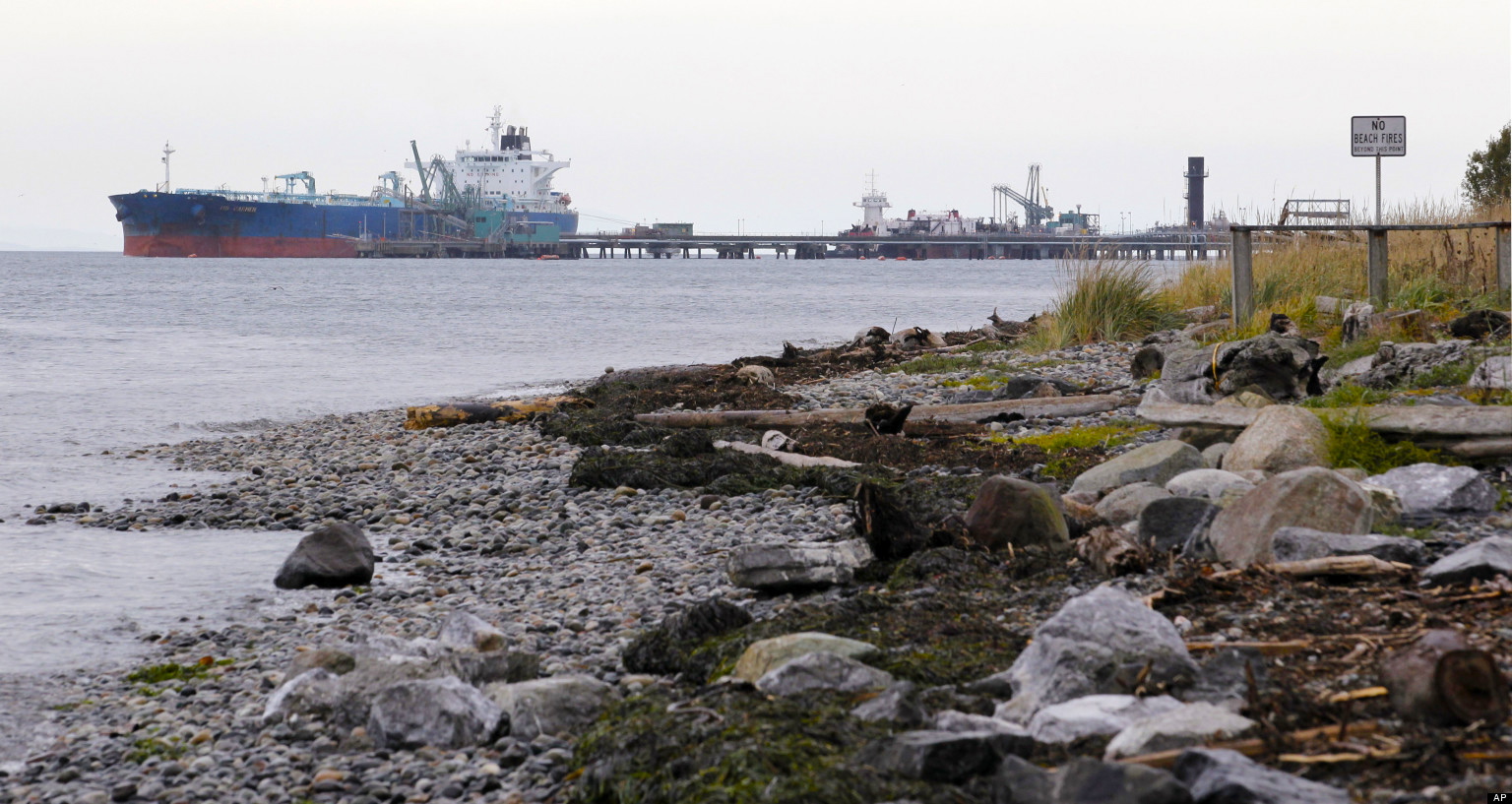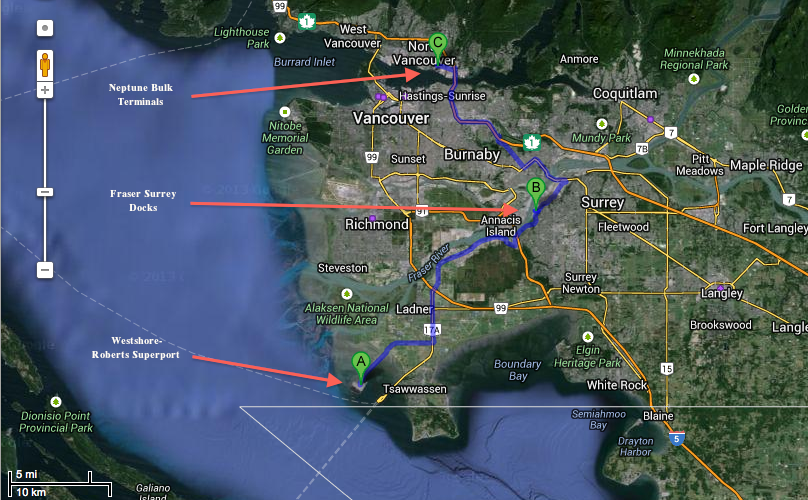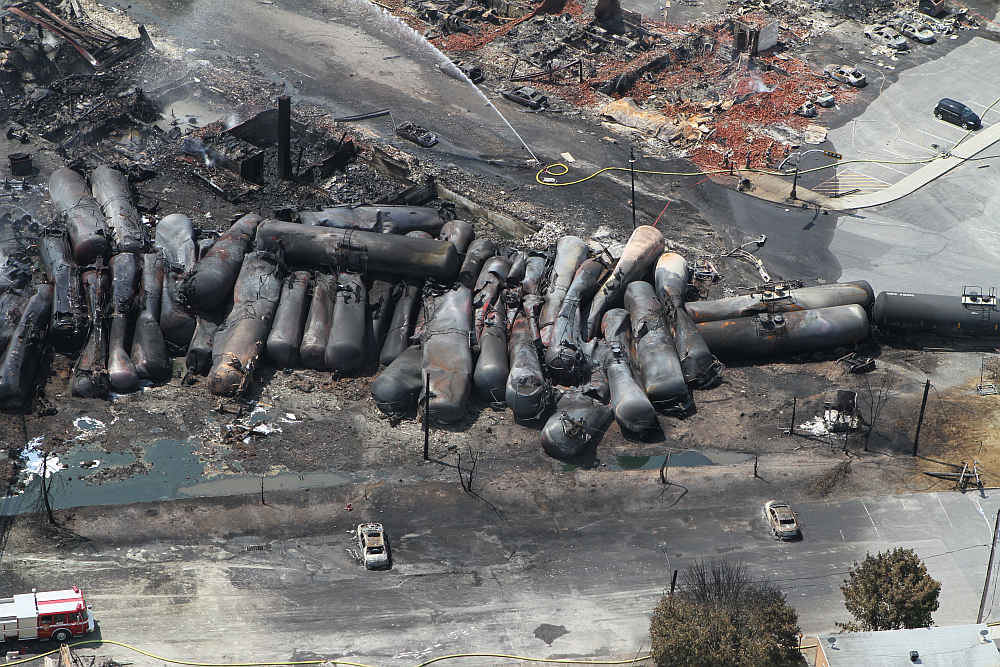
This article is a follow-up to an earlier introduction to the coal export issue in the Pacific Northwest. It is not a comprehensive list of all energy export proposals, but an overview of significant developments and upcoming responses.
A perverse thing is happening in the Pacific Northwest. Energy corporations are trying to slip their fossil fuels through some of the most progressive, environmentally conscious communities in North America, and build the infrastructure to send these carbon bombs to foreign ports.
Activist groups and concerned citizens have turned out in record numbers to challenge these projects and corporations, on both the U.S. and Canadian sides of the border. In Washington and Oregon the focus of opposition has primarily been on coal export, whereas British Columbia has seen more Liquefied Natural Gas (LNG) and oil pipeline action. Both countries are faced with an unprecedented onslaught of all three fuel proposals that, taken together, represent a dangerous late-game play from a flailing industry.
At a church-basement meetup of activists in Vancouver, B.C., this spring, Rising Tide Portland and Rising Tide Vancouver Coast Salish Territories were talking about alliance-building. Presenters spoke of alliances not just between organization chapters, or activist groups across international borders, but of alliance-building to oppose the shipping or burning of any fossil fuel — from the coal being mined from Wyoming to Alaska, to the Alberta Tar Sands bitumen that Canada wants so desperately to monetize, to the scourge of crude oil from North Dakota’s Bakken Formation and the natural gas that is being fracked in its interior.
Unified opposition is essential on this shifting terrain: infrastructure built for imports can be re-purposed to export, and pipelines built for water can be re-purposed for diluted bitumen. And most of what can be moved by pipeline can also be moved by rail or barge if need be.
An astute presenter at the Rising Tide meetup remarked that when our movement focuses intensely on a single project or issue (the Keystone XL pipeline, for example), then shifts to another (pick anything else), the opposition remarks "Well, you can’t be against everything." The response is: Yes we can. As a matter of conscience and life-saving principle, we can stand against every source of greenhouse gas emissions. This is energy extraction and export, and we oppose it.
THE COLUMBIA RIVER GORGE: Oregon/Southern Washington
Two major events are taking place in and around Portland to raise awareness and bring groups together to take climate action.
First is The Fossil Fuel Export Forum at the Leaven Community Center (5431 NE 20th Ave, Portland, OR), on July 23, from 6:30 to 8:30 pm. Their invitation reads:
“Join us for an evening where we explore the wider regional effort to turn the NW into a dirty fossil fuel corridor. We will have a report back from a visit by Portland Rising Tide to oil, coal and gas extraction areas in North Dakota, Colorado and Wyoming. We will also talk about local organizing against coal, oil and gas terminals and infrastructure.”
The second event, part of the global Summer Heat effort, will take place on the Columbia River on July 27. Workshops and speakers will be followed by a river-wide flotilla of paddleboats and protesters at 1:30 pm. More information and registration can be found here.
Port Westward
After fossil fuel giant and owner of Canada’s Trans Mountain Pipeline, Kinder-Morgan, walked away from its 15-30 million tons/year Port Westward proposal with no advance public warning at 8:30 in the morning on May 8, the American total of coal export proposals is now down to three. It’s been tempting to celebrate, but as ever in this exhausting, legalistic game of whack-a-mole, Port Westward, in Columbia City, Oregon, now has its own crude-by-rail operation, care of a corporation called Global Partners. Global Partners is now seeking to expand this oil export capacity.
Morrow Pacific
At an estimated 8.8 million tons of coal a year, Morrow Pacific’s capacity is the smallest of the still-live U.S. proposals, and Sightline Institute, the climate think tank, argues that due to its two-port design, it would likely be the most expensive, per ton, to operate. Sightline further points out that Australian corporation Ambre Energy, the major investor behind this proposal, is still in financial muck as it remains embroiled in a lawsuit with a competitor. This means they may be particularly vulnerable to failure, even though Oregon’s Department of Environmental Quality (DEQ) has given them a first draft of the permits required to break ground.
Public outcry following the first draft approval on May 31 was so vigorous that the DEQ extended the period of comment until August 12, and offered an equivocal public statement. To make a public comment about the proposal, visit this site.
Millennium Bulk Terminal
The hearings for public comment on the Millennium Bulk Terminal have been announced. The MBT would be located in Longview, Washington, which is a small Columbia River town 40 miles north of both Portland, Oregon and its neighbor, Vancouver, Washington.
Climate activist Bill McKibben visited Vancouver and spoke to a packed house on July 17 to help shine a national light on this project, which would be as large as GPT (exporting 48 million tons of coal a year), but is located in a more conservative area where investors Alcoa, Ambre Energy, and Arch Coal have been sponsoring Little League teams for over a year now. These public hearings will be our chance to help determine the scope of the environmental review of the MBT proposal. Comments will also be submitted online, on a website to be determined.
Tentative dates for the five hearings are:
• Sept. 17 — Cowlitz Expo Center, Longview, WA
• Sept. 25 — Spokane Convention Center, Spokane, WA
• Oct. 2 — Trac Center, Pasco, WA
• Oct. 9 — Clark County Fairgrounds, Vancouver, WA
• Oct. 17 — Tacoma Convention Center, Tacoma, WA
To get information updates from the co-lead agencies about hearings and commenting, you can visit this page or sign up for this listserve.
Port of Vancouver
Also afoot in the Vancouver, Washington, area is a new proposal for a potentially 360,000 barrel-per-day crude oil export facility from the corporations Tesoro and Savage at Port of Vancouver. Reasonable objections to this project are many: aside from the obvious carbon cost, and the increased rail traffic, the risks of transporting oil by train were tragically illustrated on July 6 of this year when an unmanned oil train derailed in the town of Lac-Mégantic, Quebec, killing at least 47 people and destroying their Main Street in a huge firestorm.
A public meeting on the Port of Vancouver oil terminal proposal will be held on Monday, July 22 from 7 to 9 pm at the Port’s administrative building (3103 NW Lower River Road, Vancouver, WA 98660). A vigil for the victims of the Lac-Megantic explosions will precede the hearing, from 6 to 6:30 p.m. This oil — like that in the Lac-Megantic incident, and the oil coming through Port Westward — would come from North Dakota’s Bakken Formation, where, coincidentally, natural gas is burned off, or flared, as a waste product.
THE BORDER: Northern Washington/Southern British Columbia
Gateway Pacific Terminal
The largest and thus far most contentious coal terminal proposal, which promises 48 million tons of coal shipped per year, is in a short period of quiet. After the fiery public scoping period ended this spring, the co-lead agencies (The Army Corps of Engineers, the National Environmental Protection Agency and the State Environmental Protection Agency) went back to their corner to complete a Draft Environmental Impact Statement. When this document is completed, it will be submitted for public review.
Of pressing importance to this proposal are the upcoming Whatcom County Council elections, where 4 of 7 seats are opening up. Whoever is elected will be voting on the approval of two land-use permits necessary for the GPT proposal, called the Major Development Permit and the Shoreline Substantial Development Permit. Read Terry Wechsler’s blog post for a detailed analysisof the issue and more information on the candidates.
METRO VANCOUVER
Two proposals to build out existing coal export facilities, and one to be built from scratch in the vicinity of Vancouver, BC, have met with local opposition, including a City Council symbolic vote declaring the area a “coal free” zone. But the recent federal defunding and resulting closure of the Fraser River Estuary Management Program (FREMP) leaves environmental oversight largely in the hands of the Port Metro Vancouver itself. FREMP has reviewed the environmental impacts of development proposals for 28 years. Its closure is part of the Harper government’s deregulation, consolidation and obscurantism policy.
By strange coincidence, FREMP was headquartered in Burnaby, the town in which Kinder-Morgan’s 60-year-old Trans Mountain Pipeline reaches the water, also the end site of their proposed twin pipeline. The TMP was shut off twice in June due to oil leaks. Here are starkly differing accounts of the leakage, one from the Canadian Broadcasting Corporation, and the other from a concerned citizen.
Westshore-Roberts Bank Superport
A fire broke out at the Westshore Terminal in Delta, B.C., on Tuesday, July 16. The fire occurred on a berth that earlier this year was damaged in a collision with the Japanese ship, the Cape Apricot. The owners of this accident-prone piece of infrastructure are looking to expand its coal capacity to 33 million tons annually, and despite the port’s denials, local officials believe that oil and LNG plans may also be in the works.
Fraser-SurreyThis controversial project would add 8 million ton/year export capacity to an existing shipping facility in Surrey, on the Fraser River. Opposition in the area comes from all over, including Metro Vancouver and a particular hotbed of opposition, White Rock, B.C., a town along the proposed rail route to this project. New Westminster, on the far shore of the Fraser River from the proposed site, also joined the conversation with a unanimous vote against the proposal. Some environmental activists are appealing to the cruise-ship industry for support against coal traffic.
Fraser-Surrey Docks and Port Metro Vancouver are coming under criticism for overseeing their own review process. Of particular concern is the position taken by Port Metro Vancouver’s vice-president of corporate social responsibility, Duncan Wilson, who says that because coal is an unregulated commodity, climate change is outside the scope of the permitting process. As in the United States, no precedent has yet been set of climate change as a factor in approving development.
Neptune Bulk Terminals
The Neptune Bulk Terminals in North Vancouver already export 2% of coal shipped internationally. Port Metro Vancouver issued permits for Neptune to increase its coal export capacity by half the current amount, from 12 to 18 million tons annually. The strenuously impartial citizens group North Van Urban Forum toured the facility in March and managed to look on the bright side, but environmental groups such as Voters Taking Action on Climate Change have called for a rejection of the Port’s decision, and Metro Vancouver (Port Metro Vancouver and Metro Vancouver are independent entities) has called for greater transparency from the Port regarding the permits they issued. Both the Fraser and Neptune proposals are still being debated, but some groups have directed their focus wholly to Fraser, considering Neptune a lost cause.
THE FAR NORTH: British Columbia/Alaska
It seems that as fossil fuel corporations face major opposition to energy export in progressive coastal population centers, they set their sites on those areas of remote coastline where the biggest struggle will be building infrastructure in harsh climates. This is particularly advantageous to them when the coastline marks the edge of a resource-rich interior, sparsely populated by people with little economic power. So what’s going on in the hinterland?
The spring election in British Columbia of pro-natural gas Premier Christie Clark was a surprising blow to the morale of climate activists. Her single-minded focus on making British Columbia a leader in LNG export is alarming, but she may also be optimistic, even by corporate standards. Confused meshes of proposals — from a massive hydroelectric dam, to power natural gas extraction and cooling, to LNG powering tar sands extraction — may seem inefficient to even a hardened resource-exploiter, as they rely on the current low price of LNG.
But it is worth noting that the LNG proposals with the most traction are not near BC’s major population centers, but in Prince Rupert and neighboring Kitimat. Rising Tide Vancouver Coast Salish Territories took a road trip to explore the northern province and connect with grassroots resisters on Canadian and First Nations land. Their reports are thoughtful and illuminating.
Ridley Island Terminals
On the northernmost shores of British Columbia, on Ridley (Kaien) Island, Prince Rupert Port bears a shipping terminal, called Ridley Terminal, which is currently expanding its capacity for coal from 9 million to 24-30 million tons annually. The major investors are Arch Coal (which also has its hands in Longview, WA), Black Hills Corporation, and Cloud Peak Energy (which is embroiled in the lawsuit with Ambre Energy).
Area opposition has mostly been focused on the ubiquitous layer of coal dust on residents’ houses, boats, lungs, etc. But in May, The Northern View, Prince Rupert’s local newspaper, ran an exhaustive exposé of Ridley Terminal’s non-compliance with its ownenvironmental mitigation procedures. Alleged violations include overloaded railcars, scanty containment efforts, and the more straightforward dumping of coal into the ocean. There were several anonymous sources.
The port responded by saying they will investigate allegations but are in good standing with all regulatory agencies, which is plausible in light of the Harper government’s policy of vanishing environmental oversight. At the same time, BG Group (formerly British Gas) has a massive LNG cooling and shipping proposal in the works for Ridley Island. The second of four periods of public comment ended on July 21. To follow the process, visit the Canadian Environmental Assessment Agency's (CEAA) webpage.
A second Prince Rupert LNG proposal from the Malaysian state corporation Petronas is at an earlier stage of development.
Kitimat
Three more LNG projects are proposed for neighboring Kitimat (pop. 9000): Shell Canada’s 12 million ton/year facility, Apache Canada and Chevron Canada’s 5 million ton/year joint venture, and the smallest one, at 1.8 million tons/year, from the BC LNG Export Co-operative project. A business-perspective comparison of Prince Rupert to Kitimat proposals can be found at Alberta Oil Magazine.
With LNG proposals coming hot and heavy, local officials have spoken out about feeling overwhelmed and ill-equipped to protect their air and water while conducting the necessary assessments, all without neglecting their ordinary governing responsibilities. They also expressed a frustration that is now familiar to climate activists internationally: given the quantity of proposals within the region, their regulatory agency, the CEAA, still isn’t performing a cumulative assessment of the many projects’ impacts combined. In response to the complaints, the Bulkley Valley MP, Nathan Cullen, encouraged local leaders to "form any alliance you can with First Nations, who in a lot of cases are on the leading edge of this."
ALASKA
Roughly 50% of the United States’ coal reserves lie under Alaskan soil and tundra. Historically, the Usibelli Mine has served Alaskan power needs and managed a modest 1 million ton annual export to Chile and Korea through the Seward Coal Terminal. But now the boom is on. Proposals include more export capacity and several new mines.
The Chuitna Coal Strip Mine would abut the Chuitna River, a salmon habitat which flows to the Cook Inlet, where an export terminal would be created. The corporate interests aim to extract upwards of 1 billion tons of coal in the next 25 years. Opposition has come from the Native American Rights Fund, Alaskans First, and the Cook Inletkeeper, among others. There is a petition and a list of contacts for public comment at this site.
Built in 1984, the Seward Coal Terminal, which exports 1 million tons/year, has been dogged by its inability to keep coal dust fromblowing into downtown Seward. Several environmental organizations including Alaska Community Action on Toxins, have filed lawsuits against them by citing health and air-quality violations. Seward is currently expanding its oil storage capacity by 8 million gallons, to 10 million gallons total.
Port MacKenzie is an existing deep water port seeking approval a new 32-mile rail extension. Connecting the port to Alaska’s rail network would ease coal and other exports out from any of the mines currently awaiting approval, and allow Port MacKenzie to better compete with Seward.
Many coal proposals are sparsely documented, including the Pebble Mine at Bristol Bay, the Wishbone Hill mine project, Chickaloon coal leases, and a plan to reopen the ironically named Healy Clean Coal Plant. The most recently updated and comprehensive information on these and other proposals appears at Ground Truth Trekking.
As in B.C., Alaska’s Governor Sean Parnell is also an LNG enthusiast. He’s been disappointed that companies such as BP, Conoco Phillips, Exxon Mobil and TransCanada have come in late on the large-scale Alaska South Central LNG project after he offered them tax breaks to invest in it. No large scale organized opposition is in evidence, but even so, one pipeline cheerleader blog declared the “Project Pulse: Flatlined."
THE BIGGER PICTURE
If you didn’t catch President Obama’s speech on climate change, here’s a link. It’s heartening to watch him declare, in shirtsleeves, wiping the sweat from his forehead, that “we don’t have time for a meeting of the Flat Earth Society.” But even if he makes a good faith effort to execute the plan he’s described, he has his work cut out for him in the petroleum-drunk retirement community that the capitol has become.
One representative piece of bad news came in mid-June when the Army Corps of Engineers rejected calls for a Pacific Northwest area-wide review of coal export impacts. Just as in Prince Rupert and Kitimat, the cumulative review had been a major goal of climate activists and environmental organizations in Washington and Oregon, because of the sheer quantity of coal that might soon be moving through the area.
If separate corporations never have to take stock of the effects of these projects together, the cumulative cost to citizens will come as an ugly surprise after several facilities are up and running. Unfortunately, the ACOE decided that the big picture is not their job. Acting Chief of regulatory affairs, Jennifer Moyer, testified to the House Energy and Commerce Committee that "many of the activities of concern to the public, such as rail traffic, coal mining, shipping coal outside of U.S. territory, and the ultimate burning of coal overseas, are outside the Corps' control and responsibility." This decision flies in the face of Obama’s National Environmental Policy Act directive, but surprises approximately no one.
The Rising Tide organization believes that a focus on the White House is a waste of energy. They say that if corporations don’t see national boundaries, environmental activists ought not either. And it’s true that the differences between Canada and the U.S.’s environmental regulations are not so important when you’re engaged in direct action. Obama almost seems to agree when he says:
“Americans are not a people who look backwards, we’re a people who look forward. We’re not a people who fear what the future holds, we shape it. What we need in this fight are citizens who will stand up, and speak up, and compel us to do what this moment demands. Understand that this is not just a job for politicians, I’m going to need all of you to educate your classmates, your colleagues, your parents, your friends. Tell them what’s at stake. speak up….push back on misinformation… Broaden the circle of those who are willing to stand up for our future.”
And in an environment where even the president’s remarks on climate change disappear from the major news outlets without a ripple, and the news agency Reuters dissolves its climate bureau hastily and privately, it’s never been more important to write, report, and share what you know. Taking the broad view of energy extraction and export doesn’t mean losing the specificity of our urgent, ground-level work for a bigger, vaguer picture. It means having more allies, more resources, and greater rhetorical tools. It means having one enemy, no matter how many ugly heads rear up in how many far-flung places. We are all in the same fight.
3 WAYS TO SHOW YOUR SUPPORT
- Log in to post comments


















